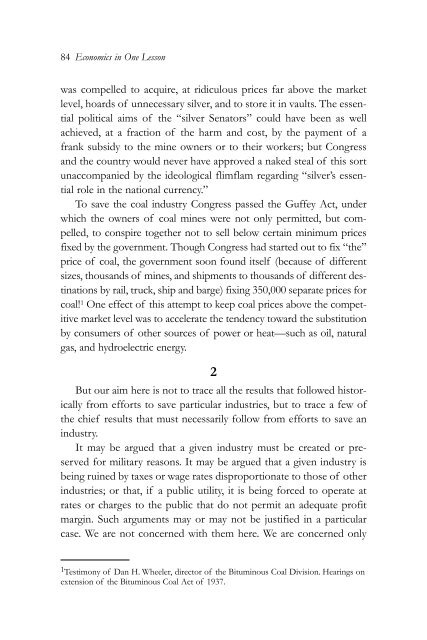1gDdM7w
1gDdM7w
1gDdM7w
- No tags were found...
Create successful ePaper yourself
Turn your PDF publications into a flip-book with our unique Google optimized e-Paper software.
84 Economics in One Lessonwas compelled to acquire, at ridiculous prices far above the marketlevel, hoards of unnecessary silver, and to store it in vaults. The essentialpolitical aims of the “silver Senators” could have been as wellachieved, at a fraction of the harm and cost, by the payment of afrank subsidy to the mine owners or to their workers; but Congressand the country would never have approved a naked steal of this sortunaccompanied by the ideological flimflam regarding “silver’s essentialrole in the national currency.”To save the coal industry Congress passed the Guffey Act, underwhich the owners of coal mines were not only permitted, but compelled,to conspire together not to sell below certain minimum pricesfixed by the government. Though Congress had started out to fix “the”price of coal, the government soon found itself (because of differentsizes, thousands of mines, and shipments to thousands of different destinationsby rail, truck, ship and barge) fixing 350,000 separate prices forcoal! 1 One effect of this attempt to keep coal prices above the competitivemarket level was to accelerate the tendency toward the substitutionby consumers of other sources of power or heat—such as oil, naturalgas, and hydroelectric energy.2But our aim here is not to trace all the results that followed historicallyfrom efforts to save particular industries, but to trace a few ofthe chief results that must necessarily follow from efforts to save anindustry.It may be argued that a given industry must be created or preservedfor military reasons. It may be argued that a given industry isbeing ruined by taxes or wage rates disproportionate to those of otherindustries; or that, if a public utility, it is being forced to operate atrates or charges to the public that do not permit an adequate profitmargin. Such arguments may or may not be justified in a particularcase. We are not concerned with them here. We are concerned only1 Testimony of Dan H. Wheeler, director of the Bituminous Coal Division. Hearings onextension of the Bituminous Coal Act of 1937.


